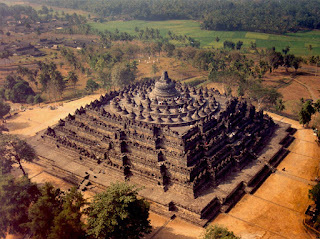No other monument in the world accomplices what Borobudur does.
Borobudur was built on a small hill in Kedu Basin, a rich and fertile
valley surrounded by spectacular volcanoes. To the east lie Merapi and
Merbabu and to the north lies Sumbing and Sindoro. The unusual jagged
Menoreh Hills encircle the temple to the South and West. The temple is
also located near the meeting place of two rivers, the Elo and the
Progo. These rivers are believed to be symbolic of the Gangga and
Yamuna, the two rivers feeding the Indus valley in India. The location
was most likely chosen for its central location and expansive views.
Borobudur lies directly south of Tidar Hill, a small knob on the valley
floor which according to myth place nailed the island of Java .
We get senses of the grandness from the landscape when we climb to the
final terrace of the monument which opens up into 360 degree view of the
magnificent valley. This feeling of freedom and openness evokes the
sense of spiritual release that occurs in Buddhist philosophy when
someone enters the Arupadhatu, the sphere of enlightenment which is
manifested on the final terrace of the monument.
This famous Buddhist temple, dating from the 8th and 9th centuries, is
located in central Java. It was built in three tiers: a pyramidal base
with five concentric square terraces, the trunk of a cone with three
circular platforms and, at the top, a monumental stupa. The walls and
balustrades are decorated with fine low reliefs, covering a total
surface area of 2,500 m2. No other monument in the world accomplices
what Borobudur does, either in term of the sheer scale on which stone
panels have been carved to tell the stories about Buddhism, in the more
subjective way in which these stories, man of them highly abstract, have
been represented which such great artistry.
We know now that the 1.460 narrative panels on Borobudur were created to
illustrate five Buddhist scriptures. Although the relief still poses
many fascinating problem, scholars have solved the principal mysteries
regarding the text which they are based. Various factors made it
difficult to identify the stories told in the relief. Artists often
depicted the same persons or objects differently in different panels,
even in adjacent ones.
They also avoid showing conflicts, violence or suffering – precisely the
scenes that are easier to identify. The lowest level has 160 relief’s
depicting the law of cause and effect; the middle level contains various
stories of Buddha’s life from the Jataka Tales; the highest level has
no relief’s or decoration whatsoever has a balcony, square and shape
with round walls. around the circular platforms are 72 openwork
stupas, each containing a statue of the Buddha. The monument was
restored with UNESCO's help in the 1970s. source:
www.borobudurpark.co.id
Travel tips to Borobudur temple
Always use a tour guide
The best thing you can do to visit bororbudur is using the services of a
tour guide. Tour guides at the Borobudur temple is more knowing the ins
and outs at Borobudur temple, ranging from history to myth that you may
have never heard before. Distinctive style and unique submission of any
tour guide, will certainly make your trip more interesting and
meaningful.
Visiting in a group
Borobudur temple area manager will arrange a visit by a group consisting
of at least 30 people. Each group will be accompanied by the officer
who will direct the traffic lane during the Borobudur Temple. To
regulate the movement of tourists who visit in large amounts, there are
two paths excursions, ie the yellow line and green line. It is made to
avoid the buildup of tourists in one place.
Dress
To enter the Borobudur temple area, you are required to dress a polite
and courteous. We recommend that you use comfortable cotton clothing.
Avoid to use of shoes or sandals with high heels. Use Sandals or
comfortable shoes for walking. If you come in the morning, there is a
good idea to bring a jacket, the air around the temple of Borobudur will
feel very cold when morning. For each adult visitor shall use batik
sarong that has been provided. When finished exploring the temple of
Borobudur, do not forget to return the sarong.
Time to visit
Borobudur temple area opening hours starting from 6 am till 5 pm. We
recommend that you come in June, July, or August. Because, in these
months tend to be sunny weather. However, Borobudur is always beautiful
at any time visit
Visiting rules
-. Avoid to climb, occupying the stupa, or doodling body temple.
-. Avoid to bring food when you get around Borobudur temple, brought the
a sharp weapon, musical instruments, as well as animals.
-. Do not throw your garbage everywhere, especially in the area Borobudur temple.
Comply with any rules that exist in the area of Borobudur temple, is the
highest award of any traveler to this temple of Borobudur. This is
because the age of the rocks at the Borobudur Temple is very old and has
been slowly eroded so that your participation during a visit in the
area is very large in an effort to preserve the existence of this very
famous temple.





Tidak ada komentar:
Posting Komentar